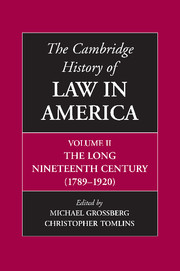Book contents
- Frontmatter
- 1 Law and the American State, from the Revolution to the Civil War: Institutional Growth and Structural Change
- 2 Legal Education and Legal Thought, 1790–1920
- 3 The Legal Profession: From the Revolution to the Civil War
- 4 The Courts, 1790–1920
- 5 Criminal Justice in the United States, 1790–1920: A Government of Laws or Men?
- 6 Citizenship And Immigration Law, 1800–1924: Resolutions Of Membership And Territory
- 7 Federal Policy, Western Movement, and Consequences for Indigenous People, 1790–1920
- 8 Marriage and Domestic Relations
- 9 Slavery, Anti-Slavery, and the Coming of the Civil War
- 10 The Civil War And Reconstruction
- 11 Law, Personhood, and Citizenship in the Long Nineteenth Century: the Borders of Belonging
- 12 Law in Popular Culture, 1790–1920: The People and the Law
- 13 Law and Religion, 1790–1920
- 14 Legal Innovation and Market Capitalism, 1790–1920
- 15 Innovations in Law and Technology, 1790–1920
- 16 The Laws of Industrial Organization, 1870–1920
- 17 The Military in American Legal History
- 18 The United States and International Affairs, 1789–1919
- 19 Politics, State-Building, and the Courts, 1870–1920
- Bibliographic Essays
- Notes on Contributors
- Index
14 - Legal Innovation and Market Capitalism, 1790–1920
Published online by Cambridge University Press: 28 November 2008
- Frontmatter
- 1 Law and the American State, from the Revolution to the Civil War: Institutional Growth and Structural Change
- 2 Legal Education and Legal Thought, 1790–1920
- 3 The Legal Profession: From the Revolution to the Civil War
- 4 The Courts, 1790–1920
- 5 Criminal Justice in the United States, 1790–1920: A Government of Laws or Men?
- 6 Citizenship And Immigration Law, 1800–1924: Resolutions Of Membership And Territory
- 7 Federal Policy, Western Movement, and Consequences for Indigenous People, 1790–1920
- 8 Marriage and Domestic Relations
- 9 Slavery, Anti-Slavery, and the Coming of the Civil War
- 10 The Civil War And Reconstruction
- 11 Law, Personhood, and Citizenship in the Long Nineteenth Century: the Borders of Belonging
- 12 Law in Popular Culture, 1790–1920: The People and the Law
- 13 Law and Religion, 1790–1920
- 14 Legal Innovation and Market Capitalism, 1790–1920
- 15 Innovations in Law and Technology, 1790–1920
- 16 The Laws of Industrial Organization, 1870–1920
- 17 The Military in American Legal History
- 18 The United States and International Affairs, 1789–1919
- 19 Politics, State-Building, and the Courts, 1870–1920
- Bibliographic Essays
- Notes on Contributors
- Index
Summary
Legal innovation in certain fields of property, contract, tort, and corporate law did much to constitute a distinctively American capitalist market economy from 1790 to 1920. British and continental European capitalist systems were characterized by dependence on larger state bureaucracies, whereas American market capitalism resolved social conflict through an adversarial judicial process. “Until I went to the United States,” wrote Matthew Arnold in 1888, “I had never seen a people with institutions which seemed expressly and thoroughly suited to it.” A half-century earlier, Alexis de Tocqueville had contrasted the egalitarian ideology of American democracy with the peoples’ trust that difficult and contentious public issues were best left to judges. These comments suggest that the process of judicial dispute resolution did much to legitimate American society’s changing conception of liberty. Paradoxically, however, enduring conflicts over liberal economic rights created divergent market statuses for free Americans and unfree “others.” In this chapter we examine, first, how the changing constitutional order shaped a producer-oriented political economy; second, the property and contract law promoting that outcome from 1790 to 1860; third, how changes in the constitutional order fostered corporate capitalism from the Civil War to the Progressive era; and fourth, the new economic rights claims that emerged during those same decades. A conclusion suggests that Supreme Court Justice John Marshall Harlan embodies the strengths and weaknesses of American liberal capitalism throughout the entire period.
- Type
- Chapter
- Information
- The Cambridge History of Law in America , pp. 449 - 482Publisher: Cambridge University PressPrint publication year: 2008
- 1
- Cited by

